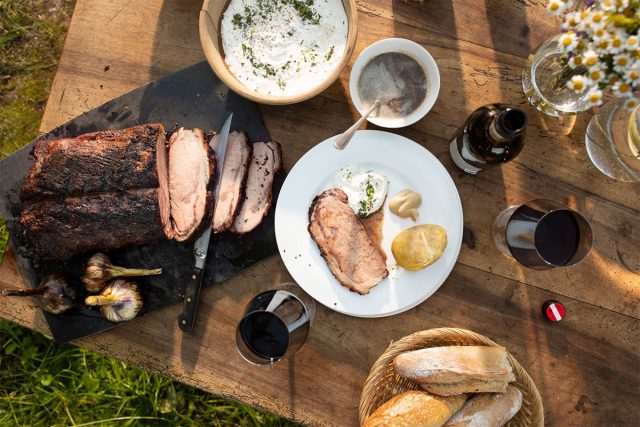This website uses cookies so that we can provide you with the best user experience possible. Cookie information is stored in your browser and performs functions such as recognising you when you return to our website and helping our team to understand which sections of the website you find most interesting and useful.
Here’s why Austrian wine should be at your next summer barbecue
Summer is barbecue season, and with dry weather forecast for the foreseeable future it is the perfect time to fire up the grill and open some Austrian wines to pair with your feast.

Though Austria might not be the first place to come to mind when we think of barbecuing, the country has its fair share of outdoor cooking enthusiasts. Adi Matzek is the two-time world barbecue champion who runs Austria’s first barbecue school. When considering wine pairings, his approach is to consider how the food has been cooked: “When choosing the right wine, the first question you need to ask yourself is whether you’re cooking over direct or indirect heat.”
The distinction between whether the food is gently cooked or chargrilled on high heat profoundly changes how it tastes, and therefore what works with it. “Tannins and charcoal flavours go very well together,” explains Michael Grossauer of El Gaucho steakhouses. For meat cooked low and slow (“the classic barbecue method,” according to Matzek), the wine should be more subtle with lower tannins – Pinot Noir, Zweigelt and St. Laurent, for example.
There are flavours other than charcoal to consider. Spicy seasonings pair well with lower alcohol fruity wines, such as Wachau Rieslings with some residual sugar. By contrast, a smoky barbecue sauce works best with a dense red that can stand up to that intensity, something along the lines of a Mittelburgenland Blaufränkisch would work.
Once you have considered the cooking method and the sauces/seasonings, it is then time to consider what you are actually barbecuing. Sausages, with their relatively high fat content, are complemented by chilled, fruity reds and crisp, dense whites, such as a Morillon (Chardonnay) from Südsteiermark. For something slightly leaner, like a grilled sirloin, a Blaufränkisch from Eisenberg brings character to complement the meat.
For fish, rosé is a good all-rounder, though more strongly-flavoured grilled or oily fish can be elevated by light reds. The classic pairing would be white, as Ferdinand Trauttmannsdorf from Gut Dorneau, a family-run fishery south of Vienna, argues: “The delicate flavour of Austrian char is brought out beautifully with a glass of Riesling from the Kamptal or a classic Grüner Veltliner from the Wachau”.
Then again, with an increasing number of people turning towards flexitarianism, vegetarianism and veganism, vegetables will also be appearing on many people’s grills this summer. Pinot Gris has a wet stone aroma which plays nicely with chargrilled courgettes, aubergine and peppers, whereas mushrooms, with their ‘meatier’ qualities, can work with a lightly-chilled low tannin red. Potatoes flavoured with rosemary on the other hand work wonders with a delicately fragranced rosé.
Grilled fruit has become hugely popular in restaurants and at home, featuring in mains or desserts. Nectarine or pineapple can be amplified by a Seewinkel Trockenbeerenauslese or, from the other side of Lake Neusiedl, a Ruster Ausbruch. For a barbecued banana (with or without chocolate), a glass of Traminer can be an ideal accompaniment.
Of course, when waiting for the grill to heat up, a traditional Austrian spritzer is the perfect apéritif for your guests, made with one-third white wine to two-thirds sparkling water. It also works as a perfect palate cleanser between dishes.
For more information on pairing Austrian wines with barbecued food, click here.
If you’re searching for wines to pair with vegetable dishes specifically, click here.


